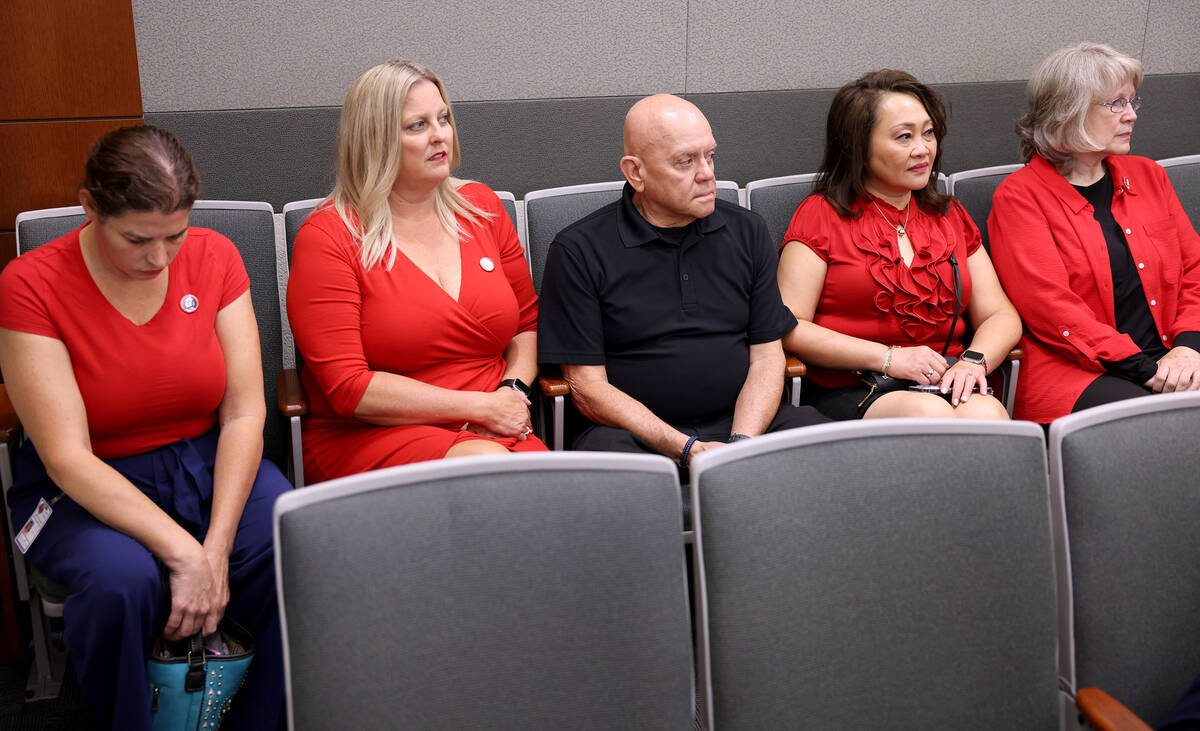Murder suspect Robert Telles, Clark County face federal lawsuit

Four employees of the Clark County public administrator’s office have sued the county and former Clark County Public Administrator Robert Telles, alleging he created a hostile, retaliatory and discriminatory work environment before he was arrested in connection with the murder of a Las Vegas Review-Journal reporter.
Current Public Administrator Rita Reid filed the federal lawsuit on Friday with county employees Jessica Coleman, Aleisha Goodwin and Noraine Pagdanganan.
The complaint alleges that Telles created a hostile work environment for all of the women, discriminating against Reid due to her age and retaliating against other employees when they filed complaints or failed to reciprocate his alleged sexual advances.
Telles formally began working as the elected public administrator in January 2019.
“Telles exhibited concerning behaviors almost immediately and targeted the Plaintiffs specifically,” attorneys wrote in the complaint. “Telles’ behaviors extended and intensified over a period of three years, during which he intentionally, and constantly, intimidated, influenced, embarrassed, humiliated, degraded and isolated the Plaintiffs.
The plaintiffs alleged that Telles isolated them, berating them for talking to one another during the workday.
In September 2022, Telles was arrested in connection with the killing of investigative reporter Jeff German. Prosecutors have accused Telles of fatally stabbing German at the reporter’s home after German wrote about Telles’ conduct as public administrator.
Telles has remained in custody since his arrest. He has pleaded not guilty to a murder charge.
Attorney Taylor Jorgensen with the Lagomarsino Law firm noted that the plaintiffs had obtained a right to sue from corresponding administrative authorities who had the chance to probe the allegations.
“As far as the why of it all, they want to honor Jeff German,” Jorgensen wrote in a statement to the Review-Journal. “He stood up for them when Clark County didn’t.”
Multiple women in the complaint accused Telles of making sexual advances towards them, and then becoming hostile when they rejected him.
Coleman, an estate technician with the office, worked in a “vault” isolated from other employees, logging decedents’s belongings. According to the complaint, Telles took advantage of Coleman’s isolated working environment to get “inappropriately close to her.”
Coleman also accused Telles of “yelling and intimidation” when she sought clarification on procedural changes he made. After serving as a witness to a complaint that Goodwin filed against Telles, Coleman alleged that Telles increased his “discrimination, harassment, and general cruelty towards her.”
In one instance, Telles told Coleman she would “die alone, and no one would find her for a long time” if she continued to work separately from other employees, even though Coleman alleged that Telles is the one who kept her away from others.
Coleman also alleged that she experienced race-based discrimination from Telles, claiming that he did not treat her well because she is a white woman.
According to the lawsuit, Telles’ behavior towards Coleman increased until she experienced suicidal ideation, and planned to hang herself in the vault “because she hoped that Clark County would then have to do something about Telles’ conduct.”
A county spokeswoman declined to comment on the lawsuit on Friday, writing in an emailed statement that the county does not comment on pending litigation.
Goodwin filed two complaints against Telles. The first came after Telles’ behavior “turned hostile” when she rejected his sexual advances. Goodwin alleged that Telles would touch the small of her back, stroke her arm, brush hair from her face, inappropriately stare at her, get too close to her, and make unwanted comments.
Goodwin also alleged that Telles discriminated against her religion. According to the lawsuit, when Telles grew more hostile toward her when he learned she was a member of The Church of Jesus Christ of Latter-day Saints.
“He would make comments stating that Goodwin knew people in the ‘Mormon Mafia’ and he was scared of who she might know and what they could do to him,” according to the lawsuit.
Goodwin later filed a second complaint against Telles for “the constant hostile work environment and discrimination against her,” according to the lawsuit.
Reid claimed in the lawsuit that Telles discriminated against her age, “calling her things like ‘an old-timer’ and saying that she was reluctant to get on board with Telles’ change.” Reid also alleged that Telles isolated her, preventing others from reporting or talking to her and drastically changing her job duties to unrealistic expectations.
Pagdanganan also alleged she was retaliated against when she served as a witness to Goodwin’s first complaint against Telles. She claimed that during the COVID-19 shutdowns, plaintiffs who had complained about Telles were placed on furlough and had to use vacation time to be paid, while he chose others to return to work.
In May 2022, German published an article about Telles’ conduct, after interviewing a half-dozen county employees about the hostile work environment inside Telles’ office, including allegations that Telles was carrying out an “inappropriate relationship” with staffer Roberta Lee-Kennett.
Friday’s lawsuit also alleged that Telles gave Lee-Kennett special treatment, allowing her to work from the office during the COVID-19 lockdowns.
The lawsuit alleged that County did not act appropriately following complaints regarding Telles’ “campaign of harassment, intimidation, and now retaliation.”
“Again, Defendant Clark County took no action in response to the complaint and utterly failed to protect Plaintiffs,” the lawsuit said.
Added Jorgensen: “Our clients want Clark County to take responsibility for its total failure to protect them. What they experienced from Telles changed their whole lives.”
“They also want to do what they can to make sure that something like this doesn’t happen again and that Clark County will be more proactive in protecting its employees,” Jorgensen wrote.
Contact Katelyn Newberg at knewberg@reviewjournal.com or 702-383-0240. Review-Journal reporter Ricardo Torres-Cortez contributed to this story.